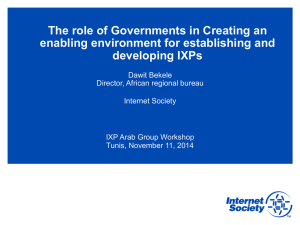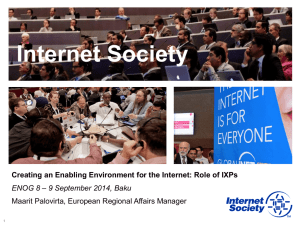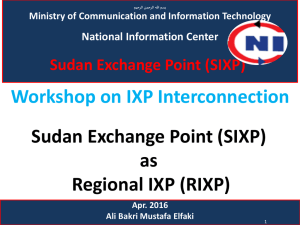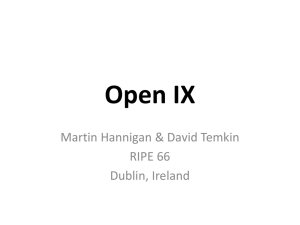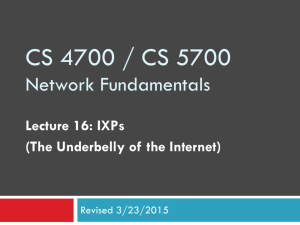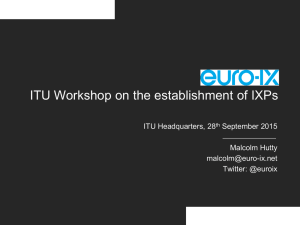IXPs | Governance and Financial Models: Best Practices for Sustainability
advertisement
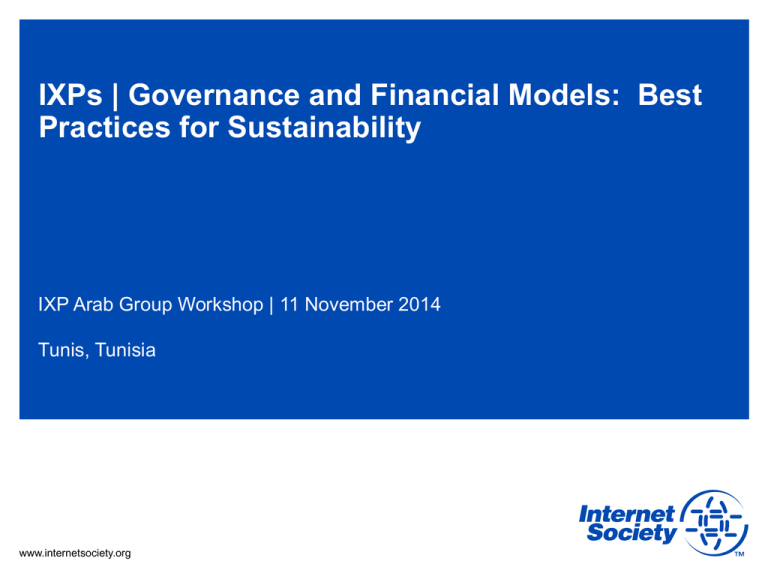
IXPs | Governance and Financial Models: Best Practices for Sustainability IXP Arab Group Workshop | 11 November 2014 Tunis, Tunisia www.internetsociety.org www.internetsociety.org Location, Neutrality, and Ownership • Location and neutrality are critical “deal breakers” for the establishment of the IXP. • Reach consensus on a potential location and neutrality of the IXP • Note: Content from AXIS I Best Practices Workshops 3 The Internet Society Location • Location is very important • The IXP location should be neutral and low cost • In considering the location of the IXP – these factors should be considered: 4 ü Space ü Environmental Control ü Security ü Power ü Access to terrestrial infrastructure ü Cabling ü Support The Internet Society Neutrality • All IXPs are owned and managed neutrally with respect to all operators (members and non-members. • Many ISPs have expressed strong feelings about the importance of neutrality of IXPs. • IXPs generally abstain from carrying out any activity that may compete with member business activities or opportunities. • If an IXP competes with members, it may lose member support. • The Important Point is that the ownership and management of the IXP should always remain neutral 5 The Internet Society Ownership • Many IXPs begin with donations of equipment, rack space, labour, and other assistance. This is part of the cooperative nature of most start-up IXPs. • For donations, written agreements are necessary to define the transaction and ownership thereafter. • Neutrality can be at stake if one member owns parts of the IXP. • Therefore the IXP should always maintain ownership and responsibility of its assets. 6 The Internet Society Governance - Key Considerations | Location Neutrality and Ownership! a 17- 19 Sept, 2012" www.internetsociety.org Location Neutrality • The ownership of the facility that houses the IXP can be a reason for “mistrust”. If one member hosts the IXP, some may believe that it benefits that member more. • Building trust essential • For example – if one company hosts the IXP – other members are paying circuit costs to the IXP and the host is not. • In this case – above – a solution is for the hosting member to offer hosting services at no cost to the IXP and its members. • Host also would pay other other costs (in this specific example) associated with hosting the IXP – power, cooling, security • Assess energy costs before start-up (Kenya) 8 The Internet Society Locations Costs 9 The Internet Society Locations Costs 10 The Internet Society Incentives! a 17- 19 Sept, 2012" www.internetsociety.org Africa and Latin America Leading Annual IXP Growth Rates Source: Kende, M., Report for the Internet Society: How the Internet continues to sustain growth and innovation, October 2012 Data from Packet Clearing House and AnalysysMason estimates The Internet Society 12 CDN Caches: Localizing International Content! 1200 • In addition to creating local hosting, local cashing of Content Delivery Network content is a key opportunity 1000 800 s t/i b 600 M 400 • Implementation of Google Caches and pops has had an impact on local traffic growth • Localized Google traffic represents more than 50% of traffic exchanged at KIXP and IXPN • CDNs report that the existence of a robust IXP is a key decision factor in decision making on cache/ pop locations The Internet Society 200 0 Mar-03 Dec-05 Sep-08 Jun-11 KIXP 350 300 250 200 s / it b M 150 100 50 00 Dec-06 Dec-07 Dec-08 Dec-09 Dec-10 Dec-11 IXPN EPF-7 Malta 17- 19 Sept, 2012" Measuring the Benefits and Impacts of IXPs: Kenya and Nigeria Case Study! • • • " • • • ! • Reduced latency and increased performance and driving demand " Direct savings on international transit ($1.5M p.a. Kenya, $1M Nigeria)" Facilitating e-government and education services" Catalyzing local hosting and content industry " Increased mobile data market by an estimated $6 million in Kenya Attracting regional traffic - KIXP http://www.internetsociety.org/ixpimpact " The Internet Society LAC IXP Study| November 2013 • LAC Findings: • Argentina: In one city à $100.00 per Mbps pre IXP/ down to $40.00 per Mbps post IXP • Brazil: NIC.br | PPT Metro System 26 IXPs attracting investment/content | 600Gbps at Peak • Ecuador: (Pre) International transit was $100 Mbps | (post) Local traffic costs $1.00 Mbps • Now running RPKI • After CDN cache installed in Quito in 2009 -> traffic up 700% • Additional Studies: • Measurement Study in Bolivia | Raspberry Pi deployment • Network efficiency Study in Argentina | Cabase and University of Buenos Aires LAC IXP Study can be found here: http://bit.ly/1k6NaO0 The Internet Society Governance/Business Models! a 17- 19 Sept, 2012" www.internetsociety.org Locations Costs 17 The Internet Society Locations Costs 18 The Internet Society Locations Costs 19 The Internet Society Locations Costs 20 The Internet Society Locations Costs 21 The Internet Society Locations Costs 22 The Internet Society Option 4: Collaborative Committee Model • Brazil’s CGI.br brings business, government, and technical experts into one committee to provide oversight while NIC.br runs the technical infrastructure • Pros • Government in an advisory role, while technical experts run the IXP • Community input considered and sustainability analyzed to maintain PTT system • 23 Cons • Potential interference in technical operations – important to allow experts to focus, and build sustainable structure • Not generally a first “level” or start-up level option The Internet Society Best Practices | Considerations For Starting-Up an IXP 24 • Know legal and regulatory parameters in advance of getting started/work with local government • Obtain ASNs and IP Addresses from AfriNIC (Brice) • Partner with Internet organizations/existing IXPs/other technical experts (PCH, NSRC) for mentoring opportunities • Avoid giving members “weighted” roles – entities are equals at the IXP (Jamaica) • Encourage Content Delivery Networks (CDNs) at IXP (Akamai, Google, CloudFlare, other) • Assess energy costs before start-up (Kenya) • Conduct a simulation of how you are going to bring equipment in, install, setup (Slovenia) • Check your fuel and energy “cut-off” situations (Slovenia) The Internet Society Keeping IXPs in Context… § IXPs can be a catalyst of a robust Internet environment and market. § Many other issues are involved in promoting a robust interconnection and traffic exchange environment in a country / region." § Barriers and bottlenecks along the service chain are various and challenging:" – Backhaul and Leased Capacity" § More costly to send traffic from Abuja to Lagos, than Lagos to London. Cape Town to Jo’burg similar" – Cross-border connectivity, policy and licensing issues" – International gateways, landing stations" § With falling international capacity prices (including around Africa), there is also opportunity to take advantage of international peering opportunities. " § ISOCs situates its IXP work within the broader interconnection and traffic exchange (ITE) context. " 25 The Internet Society Assistance 26 • Work with an Existing IXP (mentoring opportunities) • Work with an organization working to develop IXPs (AU, Euro-IX, ISOC, PCH, NSRC) • Check out the IXP Toolkit: www.ixptoolkit.org (rebooting in December) – send us input • Review Best Practices | Euro-IX: Best Current Operational Practices (BCOPs) – created by existing IXPs https://www.euro-ix.net/euro-ix-bcp • Review more Best Practices | NANOG IXP Participant (those interfacing with IXP): http://ow.ly/E5RyF • Attend Regional Network Operator Group (NOG) meetings: MENOG • Attend AfPIF – African Peering Forum and Interconnection Forum: http://www.internetsociety.org/afpif/ • Contact AfriNIC – working with IXPs and local and regional community: www.afrinic.net The Internet Society Jane Coffin coffin@isoc.org The Internet Society www.internetsociety.org
